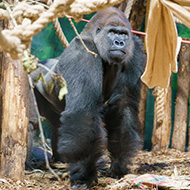
Eighteen-year-old Kiburi will lead the conservation zoo's current troop.
Keepers at ZSL London Zoo are celebrating the arrival of an endangered Western lowland gorilla, flown a whopping 1,903 miles as part of an international breeding programme.
ZSL's Glynn Hennessey said the gorilla, named Kiburi, enjoyed nutritious greens and snacked on leeks during his first-class trip from Zoo Loro Parque in Tenerife.
Weighing a whopping 193kg, 18-year-old Kiburi will lead the zoo's current troop, females Mjukuu and Effie, and youngsters Alika and Gernot, in their Gorilla Kingdom home. It is hoped that the match-matching effort will lead to a further increase in the gorilla population.
Kiburi arrived at Heathrow Airport on 17 November, where a team of vets and zookeepers at London Zoo were on standby to receive the special delivery. The move was four years in the making and followed the sad passing of London Zoo's Kambuka in 2018.
Glynn said: “We wanted to find a gorilla to lead the troop in Kumbuka’s stead, which is an important part of a healthy gorilla group’s social structure. We were excited when they suggested Kiburi - a playful but authoritative silverback who had just come of age - but we wanted to make sure, so we flew out to meet him last November and spent five days getting to know him and watching how he interacted with other gorillas.
“We found him to be a calm, friendly individual and a great fit for our own gorilla family’s dynamic. He loves a lie-in in the mornings and is more active in the afternoon, which is why we spent the past few weeks installing lots of fun new climbing apparatus for him to enjoy - when he ventures out of bed!”
In the coming weeks, Kiburi will spend time discovering the rest of his new Gorilla Kingdom home, which includes a beautiful private island with secret caverns, a huge jungle gym, and a running stream. He will also gradually get to know his new troop in preparation for their first Christmas together.
Dan Simmonds, ZSL London Zoo’s zoological operations manager who oversaw the move, said: “Western lowland gorillas are sadly declining in the wilds of central and western Africa and face threats from poaching, disease, deforestation and climate change.
“ZSL is working to protect the species at ZSL London Zoo by taking part in this vital global breeding programme, while investigating wildlife diseases at ZSL’s world-leading Institute of Zoology, working with partners in the field to strengthen wildlife protection and surveillance, and empowering local communities to combat wildlife crime.
“In time we hope to hear the pitter-patter of tiny gorilla feet once again in Gorilla Kingdom – adding to the dwindling population numbers of this Critically Endangered species.”
Image (C) ZSL London.



 The veterinary mental health charity Vetlife is inviting the veterinary community to join it for a sponsored cold-water dip.
The veterinary mental health charity Vetlife is inviting the veterinary community to join it for a sponsored cold-water dip.